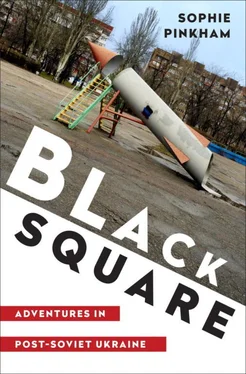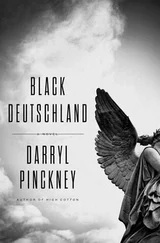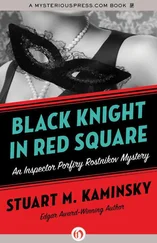At one of our preferred haunts, the Liverpool Pub, we heard a young man sing Beatles covers in Russian and English. Between numbers, he told the audience that he wished he could be a woman, like Whitney Houston.
ON OUR LAST NIGHT in Irkutsk, I ran into Tanya’s friend Zhenya at a club. She had made a particular impression on me because of her thoughtful nature and glamorous way of smoking cigarettes. She was also very beautiful, with high Irkutsk cheekbones, a heart-shaped face, and small, puckish features; she always wore a long fur coat that she had bought cheap in China. That night she seemed more hesitant than usual, preoccupied, and I asked her how she was.
“Not very well,” she said. “I have problems with my health.” I asked her if it was anything serious.
“The doctor thinks I have stomach cancer,” she answered. I didn’t know what to say.
“Oh well,” she sighed, taking a drag of her cigarette, “better not to think about it.” She told me that she had met a boy the week before and fallen in love with him at first sight. Yesterday he had taken her driving in his car. We discussed whether she should call him, as I tried not to think about her dying.
We left Irkutsk the next morning, seen off by Tanya’s tears and professions of love, and spent the next four days in Moscow, at an expensive hotel in the center of the city, gorging ourselves on fresh fruit and vegetables at the breakfast buffet, taking frequent hot showers and baths, lying spread-eagled in queen-size beds, and telling everybody about how horrible our trip had been. The other Americans seemed to have had a pretty good time. When we reported back to the program coordinator, she was appalled. “Why didn’t you tell me?” she asked. We had submitted midterm reports explaining the situation, but they had never reached her; the assistant who reviewed them had only passed on “success stories.”
A college friend who was living in Moscow took me to Patriarch’s Pond, which I’d read about in The Master and Margarita , and we watched children skating. I admired the surrounding buildings; old but well kept, they would live for a long time. My friend took me to Gorky’s mansion, a gift from Stalin, who had more sympathy for buildings than for people, and to Moscow’s Chinatown, which is very old and has nothing to do with China.
Moscow was the most wonderful city I had ever seen.
Like Russian intellectuals who came before and after him, the late nineteenth-century philosopher Nikolai Fyodorovich Fyodorov had one Big Idea. To the perennial question What is to be done? he offered a simple answer: Conquer death . In his view, mankind’s united fight against this one true enemy would bring an end to all wars between people, self-destruction replaced by self-perfection. Every generation would be resurrected, starting with the one that had died most recently and ending, several thousand years later, with the first man. These earliest ancestors were to be reconstituted from dust gathered from outer space, mankind, with its newfound sense of purpose, having learned how to synthesize bodies and steer the earth rather than being held in thrall to the sun. The legions of newly resurrected ancestors would live in colonies across the galaxy, all ruled by a Russian autocrat.
Fyodorov’s ideas intrigued generations of Russian intellectuals. Dostoyevsky wanted details: was the resurrection literal or allegorical? During his ascetic-pacifist phase, Tolstoy was impressed by Fyodorov, though mainly because Fyodorov was a vegetarian who gave away all his money and slept on a humpback trunk, covered with newspapers and using only a book as a pillow. (Tolstoy was still wearing silk underwear under his peasant smock; he envied Fyodorov’s consistency.) Fyodorov’s special appeal for writers made sense, because he loved books above all else. For him, the preservation and rediscovery of a book was a sacred task, a first step toward universal resurrection. It didn’t matter if the book was bad, because, as he put it, “behind a book, a man is hidden.”
Fyodorov was in the vanguard of the “immortality myth” that preoccupied twentieth-century Russian writers, philosophers, and scientists alike, in an era when the line between truth and fiction became exceptionally thin. Inspired by utopian fantasies and advances in the life sciences, specialists and quacks sought to prevent death using a variety of methods, including calisthenics, special diets, and the surgical insertion of animal glands; new theories were elaborated in the blossoming genre of science fiction. Aleksandr Bogdanov was a Bolshevik doctor and science fiction writer who believed that sharing the blood of young and old, healthy and sick, could slow aging and cure diseases. In his 1908 hit novel Red Star , Martians used blood exchanges to prolong their lives. When he was appointed head of a Moscow institute for blood transfusions in 1926, Bogdanov put his ideas of “physiological collectivism” into practice on Earth. Through blood, youth and health and sex drive would be distributed equally across the Soviet population. (Lenin’s sister was one of Bogdanov’s patients.) Bogdanov died in 1928, after exchanging a liter of blood with a young man who had tuberculosis.
Some revolutionary-minded Russians believed that death was merely an artifact of bourgeois capitalism. Others believed that Communism would bring relief from toil, another punishment for man’s fall. In a 1921 essay called “Idleness as the Highest Truth of Mankind,” Malevich argued that if socialism was for the good of man, and man preferred to relax, then socialism ought to maximize leisure. What happened was just the opposite. Employment became obligatory, and anyone who wasn’t officially employed was a “parasite.” Soviet culture glorified workers and machines, and workers who made themselves into machines; the scale and pace of industry were inhuman.
The Soviet “industrial novels” of the 1920s and ’30s were open about the fact that utopia would be achieved only with great suffering. In Cement, for example, the hero and heroine leave their little daughter in the children’s home so that they can work full time building a cement factory. This is not a decision they regret, even when the child dies of starvation. In Nikolai Ostrovsky’s autobiographical novel How the Steel Was Tempered , the idealistic hero, Pavel, destroys his health with revolution and labor. While still in his early twenties, Pavel is afflicted with a terrible condition that causes him intense pain, paralysis that spreads gradually across his entire body, and blindness. But like his author, Pavel continues working. Bedridden and blind, he educates young people and dictates a novel glorifying the Bolshevik revolution. Again and again, he pulls himself back from the brink of death. One of his comrades congratulates him: “Well done, Pavel, for not dying. What use would you be to the proletariat dead?”
By the time the Soviet Union dissolved in 1991, dreams of immortality, permanent vacation, and industrial paradise were long forgotten. No one thought any longer of utopia or perfection. They hoped for freedom, and for the resurrection of a functioning society. But even these dreams were too ambitious. Hyperinflation devalued money overnight, and there were food shortages and endless lines. The educational, medical, and legal systems were in shambles. The rates of murder, suicide, and death related to drunkenness, stress, and poverty skyrocketed. While the Soviet Union had guaranteed a reasonably steady livelihood for those who followed the rules—not exciting, perhaps, not lucrative, but steady—now there was panic and uncertainty.
Many people—especially the young—looked for comfort or excitement in chemicals. The old friends, cigarettes and alcohol, had become harder to get: sometimes you couldn’t buy proper cigarettes, just long uncut cigarette rolls, and people ate squares of “marmalade,” wine so old that it had turned into jelly. But drugs had become easily available, carried across newly open borders, sold under the noses of the corrupt, dysfunctional police, or made at home from poppies or chemical precursors. Alcoholism had been the scourge of the Soviet Union and the Russian Empire before it, but easily accessible drugs were a novelty, the vice of a new world. Teenagers boiled marijuana in milk in their parents’ kitchens, drinking it from glass bottles. LSD promised a world that was no more insane than the real one and perhaps more enjoyable. Amphetamines offered a sense of purpose and energy. Opiates were liquid utopia, a warm barrier against the chaos outdoors. In any society, people may use drugs for many reasons—curiosity, social pressure, self-medication, family problems—but drug use flourishes in times of social upheaval.
Читать дальше












